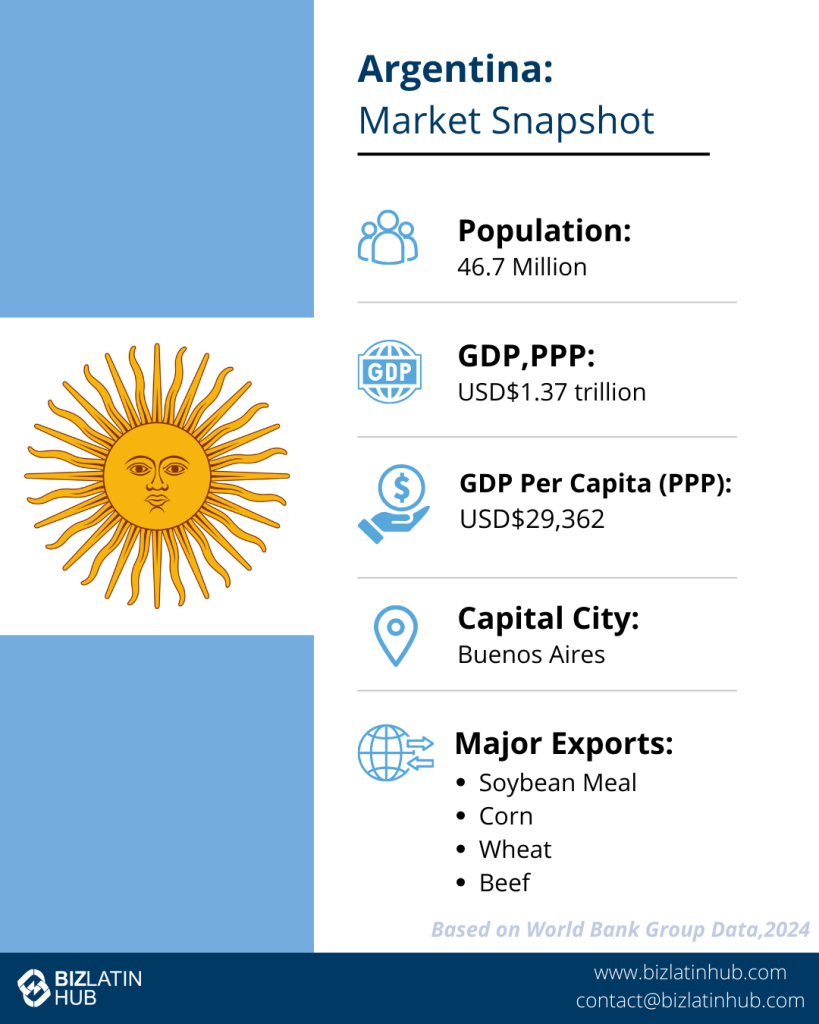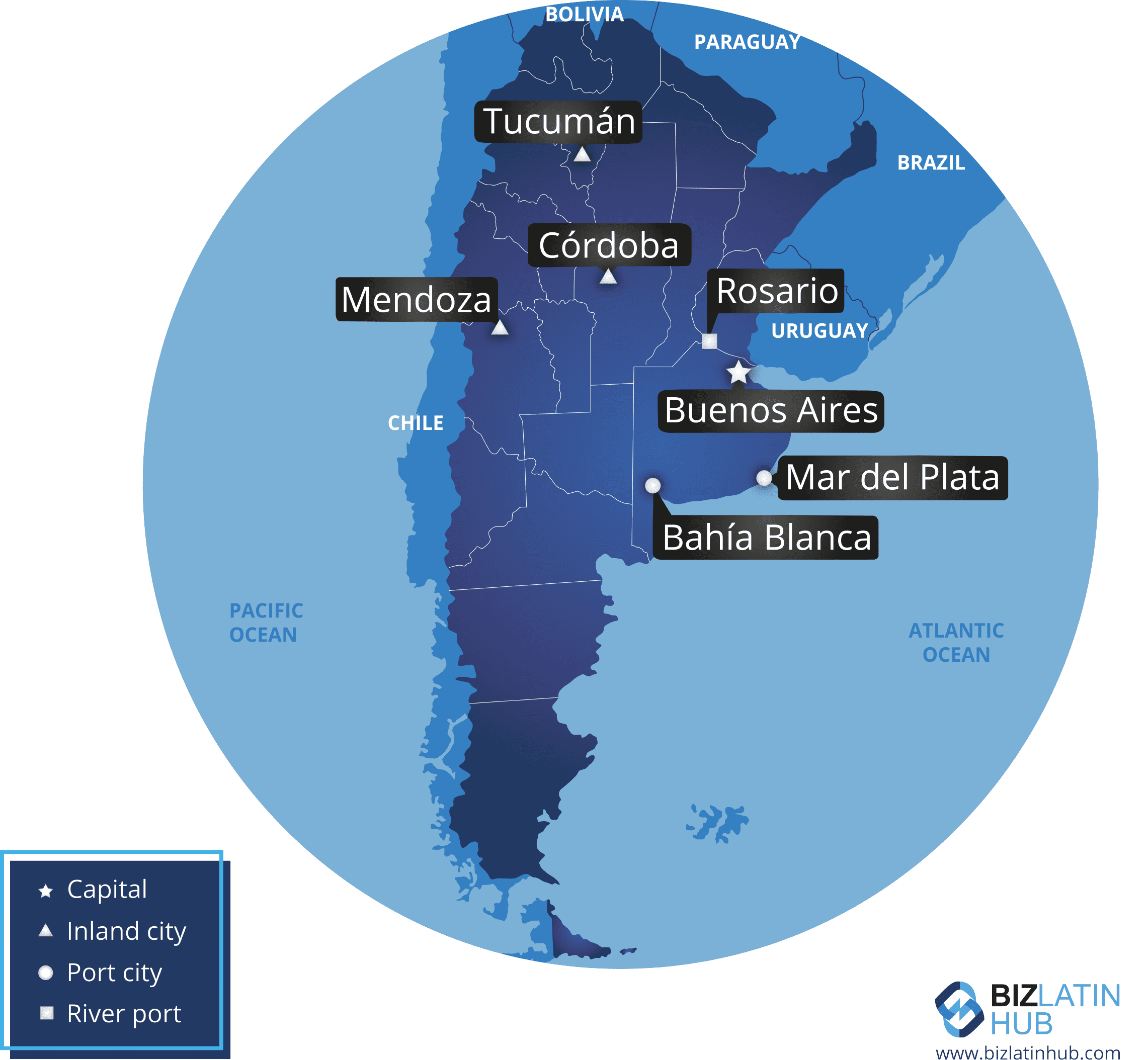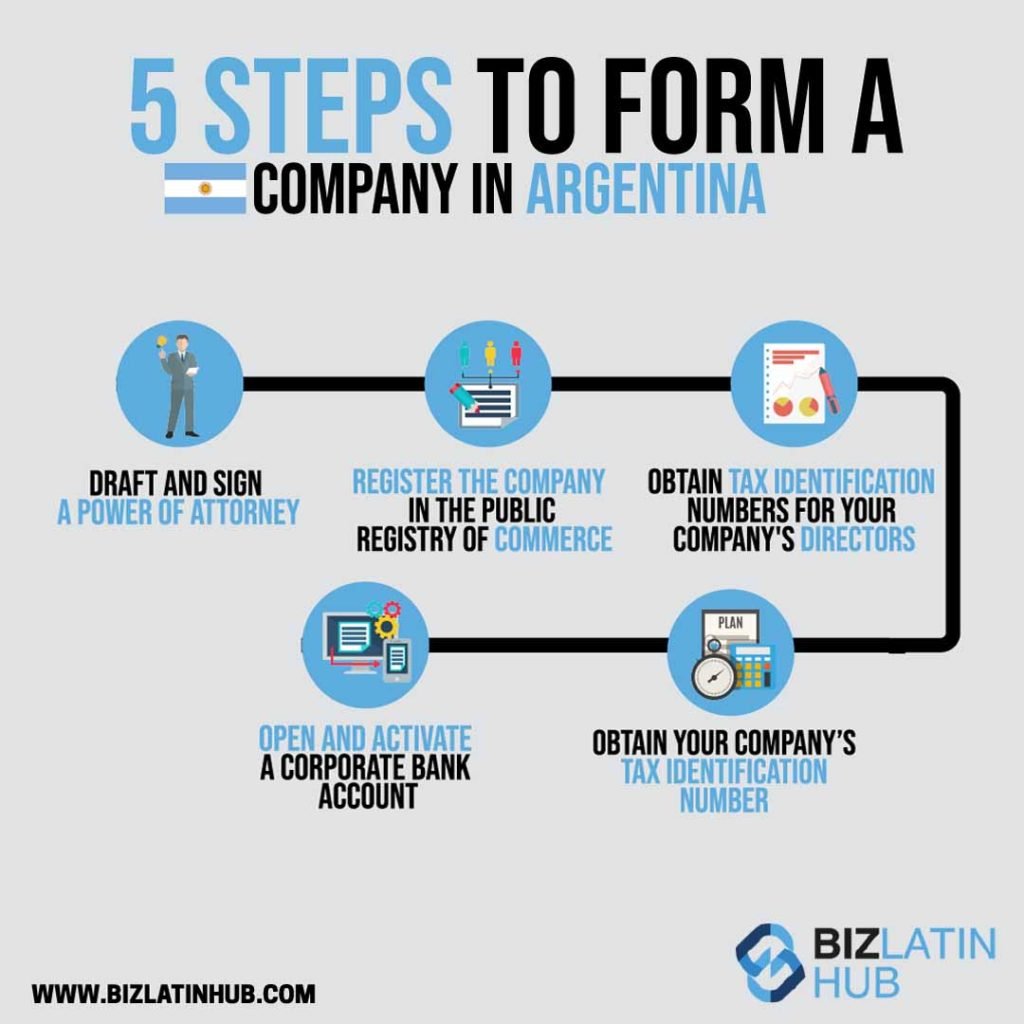Doing business in Argentina is attractive for many international investors, as the country is going through radical changes. Many of these are aimed at reducing barriers to commercial interests, promising to make it easier to get things done. However, starting a business in Argentina is still best done with local advice to navigate the specific issues that you may face in the country.
Key takeaways on doing business in Argentina
| Is foreign ownership allowed in Argentina? | Yes, 100% foreign ownership is permitted under Argentine law. |
| Strong sectors in Argentina | Manufacturing, energy and tech are all key sectors in Argentina already, with lithium extraction set to join them in coming years. |
| Are there Free Trade Zones in Argentina? | There are ten free trade zones (FTZ) in operation in Argentina that were created to encourage business growth and development. |
| Incentives for Foreign Direct Investment in Argentina | One important benefit for foreign companies is that they receive the same treatment as in the rest of Argentina in the FTZs. International trade is growing in Argentina as a result of decreased restrictions. |
| International links | Argentina is a founder member of Mercosur and has FTAs with countries around the globe. |
Strong sectors for doing business in Argentina
Despite Argentina’s macroeconomic problems and omnipresent bureaucracy, there are positive signs in three of its most important sectors:
- Manufacturing – Companies such as Toyota see Argentina as a key part of their regional factory hubs.
- Oil & gas sector – Argentina is a key exporter of oil and gas, with the Vaca Muerta fields boasting large reserves. Furthermore, according to a report published in 2024, the export of crude oil has been rising by around 30% each year.
- Electricity production – The country is adept at generating electricity, but problems persist in distributing power along the national electricity grid. If private companies and the government could work out a deal to invest in updating critical infrastructure, this would not only help to boost power generation, but also jobs as well.
Incentives for doing business in Argentina
Argentina has favorable legislation aimed at attracting entrepreneurs and foreign investment. It is home to several Free Trade Zones (FTZs) and also a few Special Customs Areas (SCAs). The principal FTZs are in La Plata, Tierra de Fuego, and General Pico La Pampa. Businesses looking to Incorporate a company in Latin America should investigate trading opportunities in these areas to take advantage of the tax benefits.
Entrepreneurship is also actively encouraged by the government, with the passing of the recent Entrepreneurs’ Law (Ley de Emprendedores). There are no restrictions on foreign investment in any industrial sectors and there is also no restriction on the percentage of foreign ownership in a local entity.
Argentina operates tax-exempt trading zones to encourage importation and exportation activities. These are the Free Trade Zones (FTZ). There are ten free trade zones (FTZ) in operation in Argentina that were created to encourage business growth and development.
One important benefit for foreign companies is that they receive the same treatment as in the rest of Argentina in these FTZs. International trade is growing in Argentina as a result of decreased restrictions on foreign investment combined with the implementation of free trade zones. Now is a great time to export to Argentina.
Free Trade Zones in Argentina are export processing areas that offer various benefits to the companies that operate businesses in these areas. These benefits include no customs duties and no value-added tax (IVA in Argentina) on goods imported into the FTZ. As a corporation operating in an Argentinian FTZ you will still be liable for corporation tax at the standard rate of 35%.
Why could doing business in Argentina continue to be challenging in the future?
Simply put, the bureaucracy, barriers and burdens that have made doing business in Argentina so painful in the past will continue into the future. Some of the key challenges for companies and investors include:
- Difficulties starting a business
- Importation, currency barriers
- Persistently high inflation
- Convoluted property registry process
- High cost of obtaining credit
- A complicated tax regime
- Complex regulations for cross-border trade
- The ongoing national debt crisis
Key challenges to doing business in Argentina

If you’re wondering if doing business in Argentina will get easier, it could – if you hire the right local legal and accountancy team that will work tireless to obtain all the licenses, certificates, notarization and documentation you will need. What follows are some of the biggest hurdles that companies and investors that plan to do business in Argentina will face:
1. When starting a business, be prepared for red tape
Starting a business in Argentina requires businesspeople to navigate a maze of bureaucracy and comply with seemingly needless requirements like notarizing employee records.
2. Import barriers, difficulty accessing foreign currency
Businesses that rely on imports to Argentina could experience delays or denials of licenses to import goods and services, and face strict limitations on a company’s ability to access foreign currency to pay for those imported goods or services. This is starting to ease, but there is a long road ahead.
3. High inflation
The annual rate of inflation in Argentina is extremely unstable by global standards, meaning that prices can be very volatile. Don’t be surprised to see frequent changes or for products to be valued in US dollars rather than Argentine pesos and offer that option to partners.
4. Registering property
Registering property requires the completion of seven procedures taking an average of 51.5 days. Before the process can begin, three different hard-to-get certificates are required, and the act of obtaining them can be costly and time consuming.
5. Costly access to credit
Bucking the inefficiency trend, getting access to Argentine credit in may be one of the most streamlined processes in the country. This may be the one glimmer of hope that doing business in Argentina will get easier. Still, there are four complex procedures to navigate and the cost of obtaining credit can be quite high.
6. Complex tax system
Paying taxes is a highly complicated process, with around nine payments needed per year, which can take roughly 312 hours of work to prepare. Argentina has very high levels of taxation and a complex system with overlapping taxes, making paying taxes a headache for businesses. The corporate tax rate in Argentina ranges between 25 to 35 percent.
7. Cross-border trade barriers

“Barriers” to Argentine trade might not be the most precise term to use, since those barriers are self-inflicted. But needless to say, cross-border trade remains challenging.
The government recently signed a series of new trade agreements with its neighbors, which sought to optimize the flow of international trade. Among the measures taken was the removal of tariffs on technological products.
Despite these efforts, Argentina remains one of the most complex countries from which to do cross-border trade. On the trade side of things, the future of doing business in Argentina seems to continue to be challenging.
8. Argentina’s sovereign debt crisis
Argentina’s economy has been hit by crises, defaults and rampant inflation for decades. This has been exacerbated by recent fears of a global recession and spiraling inflation, spooking investors over possible defaults and missed loan-repayment targets with the International Monetary Fund (IMF).

FAQs on doing business in Argentina
Answers to some of the most common questions we get asked by our clients.
1. Can a foreigner own a business in Argentina?
Yes, a business can be 100% foreign-owned by either legal persons (legal entities) or natural persons (individuals).
2. Are there Free Trade Zones in Argentina?
| Argentina operates tax-exempt trading zones to encourage importation and exportation activities. These are the Free Trade Zones (FTZ). There are ten free trade zones (FTZ) in operation in Argentina that were created to encourage business growth and development. One important benefit for foreign companies is that they receive the same treatment as in the rest of Argentina in these FTZs. International trade is growing in Argentina as a result of decreased restrictions on foreign investment combined with the implementation of free trade zones. Now is a great time to export to Argentina. Free Trade Zones in Argentina are export processing areas that offer various benefits to the companies that operate businesses in these areas. These benefits include no customs duties and no value-added tax (IVA in Argentina) on goods imported into the FTZ. As a corporation operating in an Argentinian FTZ you will still be liable for corporation tax at the standard rate of 35%. |
3. How long does it take to register a company in Argentina?
It takes between 10 to 14 weeks to form a company in Argentina after all the required information and documentation has been provided.
4. Which sectors are important in Argentina?
Manufacturing, energy and tech are all key sectors in Argentina already, with lithium extraction set to join them in coming years.
5. Does Argentina have trade agreements with other countries?
Argentina is a founder member Mercosur and has FTAs with countries around the globe.
6. What entity types offer Limited Liability in Argentina?
The S.A.S and S.R.L company types both offer limited liability protection for investors.
Biz Latin Hub can help you with doing business in Argentina
At Biz Latin Hub, we provide integrated market entry and back-office services throughout Latin America and the Caribbean, with offices in Bogota and Cartagena, as well as over a dozen other major cities in the region. We also have trusted partners in many other markets.
Our unrivalled reach means we are ideally placed to support multi-jurisdiction market entries and cross-border operations.
As well as knowledge about how the business climate in Argentina is likely to pan out, our portfolio of services includes hiring & PEO, accounting & taxation, company formation, bank account opening, and corporate legal services.
Contact us today to find out more about how we can assist you finding top talent or otherwise doing business in Latin America and the Caribbean.
If this article on whether doing business in Argentina will get easier was of interest to you, check out the rest of our coverage of the region. Or read about our team and expert authors.





